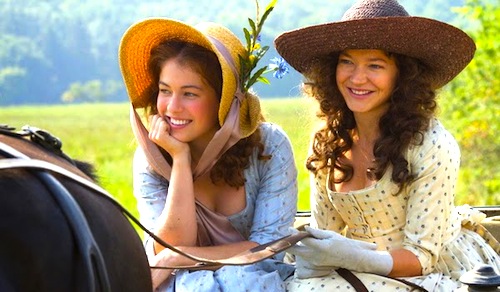By Joe Bendel. It is a love letter to love letters. Without the benefit of e-mail and cell phones, Friedrich Schiller maintained ardent relationships with both von Lengefeld sisters, often communicating through neatly folded missives. Of course it was a secret, but only from society and not the siblings themselves. Naturally, there were complications, developing and intensifying over the course of years in Dominik Graf’s Beloved Sisters, which screens in its one hundred seventy minute entirety as a Main Slate selection of the 52nd New York Film Festival.
The von Lengefeld’s are technically aristocrats, but they hardly have a Mark to their names—hence Caroline’s marriage to the wealthy but boorish von Beulwitz. It is an unhappy union, but it provides the necessary support for Lengefeld’s younger sister Charlotte and their overbearing mother. Reluctantly resigned to her fate, Caroline tries to spend as much time as she can with her sister, who has been entrusted to her socially connected godmother, in hopes she can arrange a suitable match for “Lollo.”
As a commoner known to advocate a radical Enlightenment philosophy, Schiller would hardly qualify. Nonetheless, when the younger von Lengefeld sister spies him from her window, he makes quite the roguish impression. When Caroline subsequently meets him during a holiday, she is also quite taken. It eventually leads to an understanding of sorts to share Schiller as best they can. Of course, this is easier said than done, especially for a married woman like Caroline von Beulwitz. Eventually marital statuses will change, but the two sisters’ respective relationships with Schiller, Lolllo’s future husband, will necessarily remain unequal. This consequently leads to almost three hours worth of drama.
Yes, Beloved essentially revolves around a sort of ménage a trois situation, but Graf emphasizes the literary and philosophical tenor of the times more than the potential luridness of his subject matter. In fact, the film is relatively chaste, all things considered, but there is still plenty of passion and jealousy. Yet, bigger issues loom over their private scandals, especially the French Revolution, which initially thrills and then horrifies Schiller and his intellectual circle.
Like the three-hour historical epics of old, Beloved is a big, chewy melodrama, filled with simmering yearning and cold sweats. Supposedly inspired by Schiller’s only letter to Caroline she did not manage to destroy before her death, Graf’s screenplay relies on considerable speculation, but the earnestness of the central trio gives it all the ring of truth.

While Caroline might have the short end of the ménage, Hannah Herzsprung gets the juiciest scenes as the divorcee turned romance novelist, making the most of them. It is a wonderfully complex and tragic character. However, Lollo is no shrinking violet either, nicely played by Henriette Confurius, who convincingly segues from her youthful coquetry to her more mature resolve. If anyone is underwritten here, it is Schiller, but Florian Stetter portrays him with enough charismatic likability to suspend disbelief and generally hold the proceedings together.
In a sense, Beloved is like a sequel to Philipp Stölzl’s Goethe in Love (whose protagonist Graf references but never shows), but it calls and raises its predecessor in nearly every category (especially running time, but it never feels that long). It is a smart, literate, emotionally involving film that could honestly be considered old fashion, in a good way. Recommended for patrons who enjoy quality period pictures, Beloved Sisters screened today (9/30) at the Walter Reade and screens Wednesday (10/1) at the Gilman as a Main Slate selection of this year’s NYFF.
LFM GRADE: A-
Posted on September 30th, 2014 at 10:08pm.